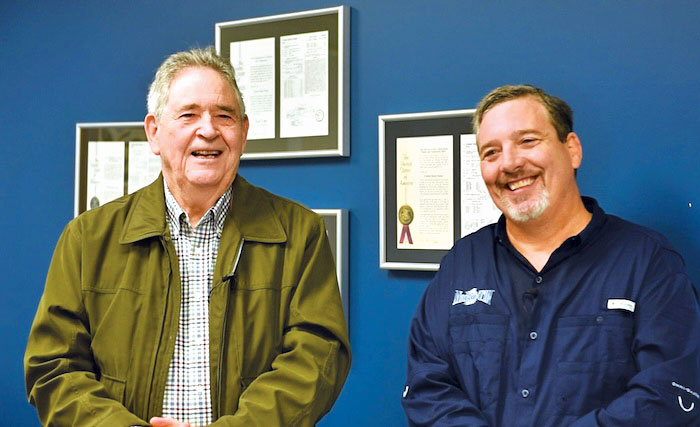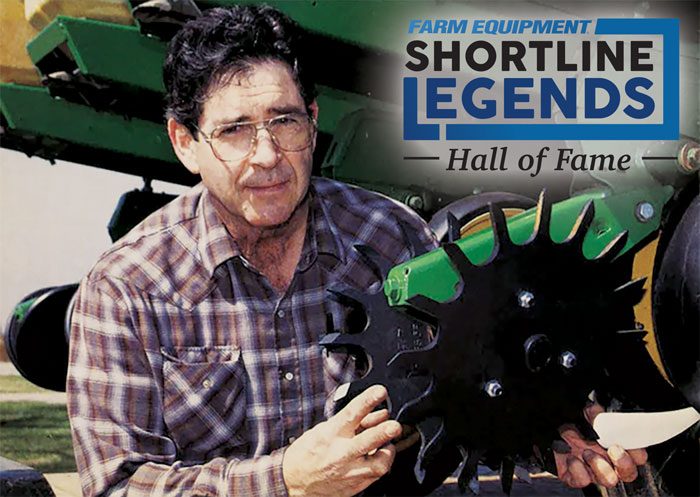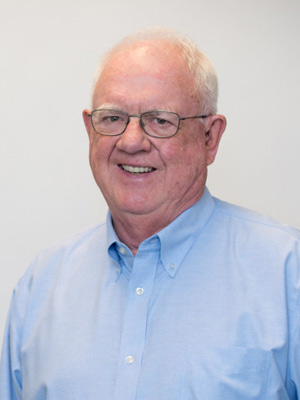Editor’s Note: Credited with inventing the first mechanical no-till row cleaner, Howard Martin left a wide swath of planter innovations throughout his career. Passing away in February 2024 at the age of 79. I’m confident Howard knew the lasting impact he’d made on no-till planting technology for generations to come.
It’s likely more no-till planting innovations and evolutions have come out of western Kentucky than any other area in North America. Leading the way in pushing planter technology forward was Howard Martin, a farmer and later, innovator, inventor and shortline manufacturer from Elkton, Ky., who passed away in early 2024.
Tackling Major Planting Concerns
When a farming friend bought an Allis-Chalmers planter in the 1970s, Martin rented the rig to no-till soybeans. After that successful experience, he mounted a toolbar on the front of his John Deere planter and attached wavy coulters.
Howard D. Martin (1944-2024)
Martin Industries (Martin-Till), Elkton, Ky.
Founded: 1991
Claim to Fame: No-Till Living Legend, No-Till Innovator credited with inventing the first mechanical no-till row cleaner.
Most planters in the 1970s had a depth-gauging wheel trailed behind the coulter and disc opener, leaving little loose soil in the row to cover the seed. To overcome these concerns, Martin added a depth tire with a large center rib (similar to the Allis-Chalmers unit) for needed seed-to-soil contact.
Yet after trying no-till in the early 1970s, Martin abandoned it due to concerns with the family farm’s hardpan compaction conditions and thick residue mixed in the soil, which led to excessive moisture and extremely poor stands.
A decade later, Martin returned in a big way to no-till, inspired by an Iowa State Univ. study showing a distinct correlation between the amount of crop residue and soil temperatures. He was convinced that pushing residue out of the row area would help the soil dry faster, raise the soil temperature and improve corn and soybean stands.
In the early 1980s, Martin was experimenting with a pair of rotary hoe wheels mounted on the front of a wheelbarrow to move residue away from the row area without disturbing the soil. This on-farm experiment eventually led to development of the first ground-driven rotary row cleaner that was patented by Martin in 1988. It allowed soils to dry out more rapidly and warm up faster, leading to improved stands and additional ideal planting days.
Three years later, Martin Industries began manufacturing and selling row cleaners from his 30- by-36-foot on-farm shop.
Perfect Timing
A card table display featuring one of the first Martin-produced row cleaners at the 1991 National Farm Machinery Show in Louisville gave a hint as to what was ahead. As farmers wrote checks on the spot for the row cleaners, Martin had to quickly figure out how to manufacture and deliver the product before spring rolled around.

Despite Martin’s successful row cleaner idea, son Steve says his dad was never a manufacturing guy; just a farmer with an inventive mind who wanted to find a good solution to tough planting problems. Jeff Lazewski
“The timing could not have been better,” says Steve Martin, Howard’s son and Martin Industries president. “Changing government policies meant highly erodible farmland could no longer be tilled and still qualify for state and federal programs.
“Had Dad come out with the row cleaner 10 years earlier, the market wouldn’t have existed. Once the government started talking about taking away subsidies if no-till wasn’t practiced, things fell into place.”
Finding Partners
The pieces started to come together when neighboring farmer and inventor Eugene Keeton asked Martin to test his newly-developed seed firmer. Other partners also soon drove the company’s designs, and in some cases changed them from something that kind of worked to something that worked very well, says Steve.
“Howard Martin’s row cleaners opened the door for farmers who wanted to no-till…”
The row cleaners, Keeton seed firmer, reduced inner diameter gauge wheels, spading closing wheels and drag chains soon after were packaged together into what became the Martin-Till Planting System.
Introduced in 1995, another Martin innovation that changed the way crops are planted was the first spiked closing wheel with a rear rubber finishing wheel. The spikes helped eliminate sidewall compaction concerns around the seed while covering the seed trench with loose soil.
Tough Times
Unfortunately, his early-day innovating came during the early 1980s, a time that proved tough on many U.S. farm families. To survive, the family dropped their crop acreage from 2,000 down to 900 acres, sold most of their machinery and family members took off-farm jobs. Steve worked as a mechanic at Roeder Implement in Hopkinsville, Ky., while brother John worked at a local factory.
Howard’s wife, Linda, started a lawn care company with local factories, cemeteries and churches as clients. Soon after, her husband became her “Weed Eater” operator in an effort to keep groceries on the table.
Once Keeton sold his planter finger pickup design to John Deere, he connected Martin with Deere reps who bought Martin’s design and promised a royalty on each sale. The Martins planned to keep farming while waiting for the royalty checks to arrive.
But the ag depression of the early 1980s wasn’t a good financial time for Deere and the row cleaner project was soon shelved. In need of those promised royalties dollars, Martin pleaded with Deere to find another row cleaner manufacturer, and the planter attachment planter innovation was soon licensed to Yetter.
Hall of Fame Digital Extras
A few years later when Martin grew concerned that manufacturing changes made to his row cleaner creation didn’t have enough heft to hold up in the field, he decided to build his own. With no cash to outsource the tooling work in 1991, Martin turned to son Steve, a self-taught mechanical prodigy, who figured out how to fabricate the units.
“Had we understood what we were getting into, we would’ve had no business trying this,” Steve says. “We had no experience in manufacturing. We were too dumb to do it, but we made it work.
“God lined everything up just right for us, and it was nothing short of a miracle. As did the publicity Dad soon got for being a farmer, inventor and manufacturer carried us, along with word-of-mouth conversations.”
‘Dad Did it His Way’
Steve recalls times when he wasn’t all that happy with his dad. “He’d be writing orders and sending them out with a ‘NC’ on the bottom of the page. ‘No charge, Dad?,’ I asked. ‘Why are you giving these parts away?’
“He repeatedly said, ‘I don’t want anybody to buy my parts and then go to the coffee shop and complain. We’re going to warranty them — sometimes even if they are out of warranty.’
“He was always committed to making it right, even if it meant me driving all night to deliver several row cleaners to a grower in western Iowa,” adds Steve. “When we exhausted all of our resources and a customer still wasn’t happy, Dad would write a refund check. That was hard for me to understand when we were struggling financially, but it built our name.”
Always Thanking Others
When talking about the success of the family business, Martin would find anybody else to brag about rather than himself. “There’s no end to how much you can accomplish if you don’t mind who gets the credit,” he often said.
“I always bragged on Eugene Keeton for being an encouragement and no-till pioneer Harry Young for being an inspiration and creating quite a stir with his pioneering no-till efforts during the 1960s and 1970s. I was fortunate to live just one county east of where no-till got its start and attended several of the Young no-till field days,” he said in a previous interview.
Martin Industries has continued to evolve from its 1,080-square-foot farm shop beginnings and today is housed in a 50,000-square-foot modern manufacturing plant and office.
The Martin family takes a great deal of satisfaction from having played an important part in the no-till movement, finding new ways to help farmers operate their planters and drills more effectively and prevent costly soil erosion.
“Thanks to Dad, we’re proud of our heritage in the evolution of no-till, planter attachments and we hope to be here for many more years,” Steve concludes.
Paying Tribute to Howard Martin
Howard started no-tilling to earn a decent living from poor-quality land and later developed specialized no-till equipment that led to the formation of Martin Industries. His development of row cleaners, fertilizer openers, closing wheels, gauge wheels and other row-unit attachments has come from a humble one-person farm shop beginning to a highly successful manufacturing company that’s a leader in the planter and drill accessory market.
I met Howard at the first Milan, Tenn., No-Till Field Day in 1981. Among the first supporters and exhibitors, he was truly an innovator, inventor and leader in no-till and conservation of our soil resources based on his own field-tested experiences.
For over 30 years, he towed his tractor and 4-row no-till/conservation till John Deere planter with the newest no-till attachments from Elkton, Ky., to the Milan field day. He also gave us the idea to set up a no-till planter demonstrations “in the field under real no-till conditions” to compare planters, attachments and drills.
It’s been rewarding to watch his company grow from a small farm shop business to a nationally known product line distributed through many dealers. He was always accessible to dealers and farmers that called for advice and help.
He loved God, his family and our God-given soil resources. He was a wonderful friend and will never be forgotten as a Christian and agricultural innovator.
— John Bradley, no-till innovator & retired director of the Univ. of Tennessee, Milan Experiment Station, Milan, Tenn.
Howard was one of the most down to earth and humble people you could ever meet. My first encounter with Howard was on the phone in 1993, discussing a problem I had with a frustrated customer over an existing row cleaner that wasn’t working. Howard sent me a couple Martin row cleaners to try and guaranteed they would work. And if they didn’t, he told me to send them back and refund the cost, as he wanted to make sure my customer was happy.
Based on that conversation, I knew Howard was genuine about his invention that he knew would work in many scenarios and situations. I became a dealer for Martin in 1993 and we have helped equip thousands of planters all over the U.S., Canada and as far away as New Zealand.
The explanation Howard offered on why his row cleaner worked best, from the diameter of the row cleaner wheel, the tooth spacing on the row cleaner wheel, to how many tines his row cleaner wheel had gave me the confidence to sell his products for over 30 years.
I look back on the legacy Howard built through all his years. This includes row cleaner innovations, row cleaner improvements from the first pin-adjust row cleaners to floating row cleaners with depth bands to better follow the contour of the soil surface in different conditions and now being able to adjust row cleaners from the tractor cab. I loved having him bounce different ideas with me over the years while trying to improve his products.
— David Moeller, Moeller Ag Services, Keota, Iowa
Shortly after starting Needham Ag Technologies, Howard asked me to work for Martin Industries as a consultant. This led to working with him on many row cleaner, closing wheel, fertilizer opener and disc opener projects. It was a privilege to work with Howard while testing many planter attachments under different soil and moisture conditions and comparing them to other brands.
Howard recognized early on that a device which parted the previous crop residue and lightly scratched the seed zone would accelerate soil warming and dramatically improved emergence uniformity. The system improved closing the seed slot, which was a challenge on Howard’s poorly-drained soils.
It was a great privilege to work with Howard and to share his enthusiasm and dedication to promote no-till practices and cover crops, plus innovate, patent and market planter attachments. His passion for making long-term no-till successful in challenging soils helped my clients adopt no-till and cover crops over a wide geography.
— Phil Needham, Needham Ag Technologies, Calhoun, Ky.







